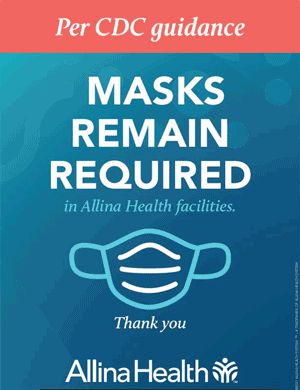
Visitor guidelines

General guidelines for all visitors or support persons
Visiting hours in hospitals are 8 a.m. to 8 p.m. See support person section for exceptions.
Family and support persons are integral members of a patient’s care team promoting collaboration in shared decision making and enhancing safe patient care. These visitor guidelines allow for this collaboration to occur safely.
For the safety of patients, visitors and staff, the Center for Disease Control (CDC) require continued masking and distancing in all healthcare settings. Visit the mask guidelines section of the CDC to learn more.
We will not restrict, limit or otherwise deny visiting privileges on the basis of race, color, creed, religion, national origin, sex, sexual orientation, gender identity, disability, age, marital or family status; though some age restrictions apply to children for safety reasons.
Masks required
- All visitors must wear a mask at all times, in all facilities, including while in the patient room (regardless of vaccination status). Facility staff will provide a mask if the visitor or support person does not have one.
- Visitors may be directed to wear additional personal protective equipment.

Screening
- Visitors and support persons must follow all visitor protocols, including masking, while in the facility. If the visitor refuses to comply, they shall be asked to leave.
- All visitors and support persons will be screened for symptoms consistent with COVID-19.
- Visitors or support persons who do not pass the screening will not be allowed to visit or accompany a patient in the clinic and hospital settings.
- Visitors must wear a visitor badge and symptoms screening sticker at all times while in the facility. If visitors go outside of the building, for any reason or length of time, they must present their screening sticker or be re-screened upon re-entrance.
Physical distancing
- Visitors must maintain physical distancing requirements (six feet apart and 50% capacity for waiting rooms) between staff, visitors and patients while in the facility and must limit the time spent outside of the patient room.
- If there are capacity issues in the waiting area, visitors may be asked to wait outside the facility.
Patient care
- Visitors may be asked to step out of the room during an exam or treatment.
- Visitors must use hand hygiene frequently, and upon request by staff.
- Staff will provide instruction, before visitors enter patients’ rooms, on hand hygiene, limiting surfaces touched, and use of Personal Protective Equipment (PPE) according to current facility policy.
- Any time a visitor cannot be present with the patient consistent with these guidelines, staff will offer other options such as virtual visits for the family.
Support person specific
For patients with an impairment or disability, an adult support person may need to be present to participate in discussions and make decisions related to the patient’s treatment. This may a guardian appointed for them or a family member acting on their behalf. The treating provider will make a reasonable accommodation based on the condition and needs of the individual patient.
- The hours a support person is present may be extended outside of standard visiting hours in order to meet patient needs.
For family and friends
Here are some additional options for staying connected with a family member or friend when they are in the hospital:

- Take advantage of virtual communication tools as explained in How to Contact a Patient in the Hospital.
- Designate a family spokesperson to serve as the link between the person in the hospital, health care providers, and family, friends and loved ones.
- Ask if the family spokesperson can call the hospital each day for an update to pass along. Ask the hospital what time would be best for a daily phone call.
- Leave the family spokesperson's phone number with the hospital staff in the event your family member or friend has a change in condition.
- Consider using internet-based social media applications like CaringBridge or Facebook to provide timely updates to others.
Allina Health’s patient video conferencing service, Care to Connect, allows you to connect remotely with your family member or friend via video if they don’t have or are unable to use their own internet-enabled device.
Age restrictions
Children ages 5-17 must be from the same household as the patient in order to visit and be accompanied by an adult that is not the patient, with the following exceptions:
- If you are under 18 and the parent of the child who is a patient, you do not need to be accompanied by an adult.
- In a clinic or similar outpatient setting, someone under 18 may be permitted to accompany a child who is a patient, if no adult is available.
- Visitors under age 5 will only be allowed under a Compassionate Care Exception (see below).
- Exceptions may be considered for antepartum patients.
- Visitors must adhere to hospital visiting hours including no overnight stays.
Specific guidelines for visitors in different settings
Visiting hours are 8 a.m. to 8 p.m.
- Adult patients: Open to visitors. Social distancing is required. Masks are required regardless of vaccination status. See above for General Guidelines that apply in all care settings.
- Pediatric patients: Two parents/guardians will be allowed per patient. Parents or legal guardians may stay overnight according to usual policy.
- Adult patients: One visitor is allowed before a patient’s surgery and can return after the surgery. The visitor can wait in the waiting room or the patient’s room (if available).
- If the waiting room is full, visitors may be asked to wait outside the building.
- Pediatric patients: Two parents or legal guardians may visit before and after surgery. Visitors can wait in the waiting room or the patient’s room (if available).
- Adult patients: One visitor for each patient is allowed.
- Pediatric patients: Two parents or legal guardians will be allowed per patient.
- Two support people are allowed per patient. This includes triage, labor and delivery.
- Ante-partum and post-partum areas can include up to two minors ages 5-17 from the same household as the parents, in addition to the three support people. (Minors visiting hours are 8 a.m. – 8 p.m., no overnight stays.) No children under age 5 may visit without special permission. Check with your hospital to learn more.
- In addition to three support people, trained doulas will be permitted for support in ante-partum, during labor and delivery and post-partum units.
- Newborns: Two legal parents or primary caretakers may visit.
- Labor and delivery patients who test positive for COVID-19 are allowed only one support person and no doulas.
Also see The Mother Baby Center visiting guidelines and frequently asked questions.
No visitors are allowed for patients receiving mental health care. The following are the exceptions to this guideline as conditions allow:
- Child and adolescent patients: Two parents or legal guardians will be allowed.
- Patients who require help due to an impairment or disability: One support person will be allowed. See above for more information on support persons.
Patients may have one clergy or community clergy member visitor in addition to other visitors listed in these exceptions.
- One visitor per patient is allowed on the unit to assist with discharge preparation.
- The patient care manager will be allowed to make determinations regarding when and which caregiver may be present for this purpose.
- If a family member or support person is unable to be physically present, virtual options should be considered.
Visitors/companions are allowed, including parents/guardians and support persons. However, since social distancing and masks are still required, we encourage any patients who are able to attend their appointment on their own to do so.
- Visitors are not allowed, except in the following circumstances:
- Compassionate care exceptions (see compassionate care exceptions accordion below)
- Patients who require assistance due to underlying impairment or disability
- Patients under the age of 18
- Laboring mothers
- One support person is allowed per maternal patient stay. This includes triage, labor, delivery and post-partum areas.
- Ante-partum patients may have one visitor. This visitor must stay in the room the entire time and may not come and go from the hospital.
- When infection prevention clearance criteria have been met
- Additional protocols as requested by staff must be followed.
Compassionate care exceptions may be used for patients who:
- are actively dying
- have a sudden decline in medical condition
- are having surgery
Case-by-case exceptions are made with the clinical team, patient care manager, house supervisor or all. Consideration may be given to patients who have extended length of stays.
How we define family
We adopt the following definition of “family” within our visitor guidelines: “Family” means any person who plays a significant role in your life. This may include a person not legally related to you. For example, “family” members include spouses, domestic partners, and both different-sex and same-sex significant others. “Family” also includes a minor patient’s parents, regardless of the gender of either parent. For the purpose of visitation, parents may include legal parents, foster parents, same-sex parents, step-parents, those serving in loco parentis, and others operating in caretaker roles.